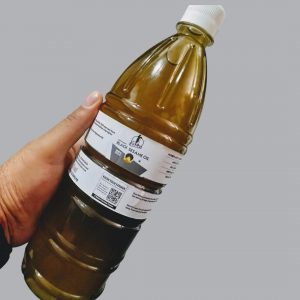Organic Gir Cow Ghee (A2)
Organic Gir Cow Ghee (A2)
Cultured Ghee is the best choice if you are dairy intolerant!
NOTE: Delivery of the Ghee in Glass Jar is not safe /feasible for transporting so the Ghee will be sent in Food Graded HDPE Jar.
Description
Description
Our traditional Desi Cow Cultured Ghee recipe has been used for thousands of years. The ancient tradition of Ayurveda considers Cultured Ghee important for strengthening Agni, our powerful digestive fire. Cultured Ghee is known as Desi Ghee in India, where the word desi means prepared with indigenous method.
Cultured Ghee is the best choice if you are dairy intolerant because during the culturing/fermentation process of cream, lactose is converted into lactic acid. This makes for a much more digestible product for many people.
Ghee making process :

Why this Ghee is different ?
- Prepared through the traditional Fermentation process especially from Ayurvedic perspectives
- Food Grade Stainless Steel vessels are used for storage and preparation.
- Prepared from In House Certified Pure Organic Cow Milk
- No Chemicals, no pesticides no hormonal injections used on cows and fodder
- No Preservatives added
- It has natural Color. No colors added
- 9 months shelf life
- Best taste and value for money attributes
- Rich in vitamins, Minerals and Metals
- FSSAI approved Organic Cow Ghee
The Cows are grass fed/ with organic fodder, produced using in house vermicompost, cow dung manure and cow urine etc.



2 reviews for 2
Only loggedin customers who have purchased this product may leave a review.
Related products
Almond oil (sweet)
₹ 300.00- Regulates Cholesterol
- Reduces Risk of Heart Disease
- Protects Against Diabetes
- Promotes Healthy Weight
- Keeps Your Colon and Rectum Healthy
- Treats Ear aches
- Great for Your Skin and Hair
How to use almond oil :
- For your hair it is advised to apply as much as needed in the roots. Almond oil has a light texture and absorbs quickly in to the scalp. Use it for the treatment of psoriasis, dry scalp and dandruff. It will also enriches the quality of hair by thickening it and adding lustre.
- Almond oil is a natural remedy for eczema , it relieves eczema symptoms of itchiness and redness. For treatment; apply drops of oil on skin in affected area and massage gently. It will reduce signs of again by rejuvenating the skin and removing dead cells.
- Apply a few warm drops beneath your bottom eyelid before bed, it will brighten up dark circles and reduce puffiness of eyes.
- For ingestion one can drizzle the oil on salads as a dressing, as it regulates cholesterol levels. It’s advisable to have 1-2 teaspoons of almond oil in morning, the oil is proven to be a natural laxative and relieves constipation.
- Calories: 120
- Total fat: 14 g
- Saturated fat: 1.1 g
- Monounsaturated fat: 9.4 g
- Polyunsaturated fat: 2.3 g
- Vitamin E: 26% of the RDI
- Phytosterols: 35.9 mg
Sesame oil (white)
What are cold pressed oils?
The oils that you use for cooking everything are extracted from seeds, fruits or vegetables and even nuts. Cold pressing is the method of oil extraction from oilseeds which may include sesame seed, sunflower seeds, canola, coconut or olive without really using heat to extract as that may degrade the oil’s flavour and nutritional quality. Cold pressing method is the process involving crushing seeds or nuts and forcing out the oil through pressure.
In olden times, a long cylindrical contraption known as ‘ghani’ was used to extract oil from oilseeds. Ghani was a mortar and pestle device made of stone or wood that used a perambulating animal to extract oil under pressure from oil-bearing seeds. This was the simplest method for cold pressing oils out of a seed as it didn’t involve the generation of too much heat.
What is available at most stores & supermarkets ?
If you are careful enough you will see different kinds of labels on your oil packaging :
“Losorb”
“Lite”
“Blanched”
“Refined”
What these words really mean is “our oil has gone through tons of chemical processes and is stripped of all it’s natural nutrients!”
What is Oil Refining?
Refining is a process of purification of oils. In this process, oils are robbed of naturally occurring gums, proteins, phospholipids, fine seed particles etc. This makes the oil “light/losorb”. Oils are also neutralized (acidity balanced!), bleached (stripped of color) and deodorized (devoid of it’s natural aroma). And to achieve all these the oil is heated at high temperatures and is treated with chemicals etc.
In a nutshell, modern refined cooking oils provide nothing but pure empty calories (devoid of all nutrients but fats!)
Here’s what Oil Refining looks like :
Why do oil companies sell Refined Oils ?
•Yield
•Shelf Life
•Price
•Modern cooking style of “deep frying”
Why you should move to cold pressed oils :
• Nutritionally Rich: Be it traditional lakdi ghana/kachchi ghani/chekku ennai or commercially prepared extra virgin oils (made using temperature controlled expeller pressing method), cold pressed oils retain most of proteins, vitamins, phosholipids, antioxidants, lecithin etc. And obtaining these essential nutrients from an all natural source is a much wiser and holistic choice than getting them from multivitamin pills.
• Chemical Free: During refining, various chemicals are used like Hexane, Sodium Hydroxide, Sodium Bicarbonate (baking soda), Bleaching Agents etc. And on top of that chemicals like Propyl Gallate, BHA, BHT are introduced as preservatives! Now not all of these are exactly toxic or carcinogenic , but if you are someone who is conscious about living organically and staying away from chemicals, you should consider switching back to cold pressed!
• Forgotten Flavors: Virgin oils, their flavor and aroma, compliments all Indian foods and the spices well. Get those forgotten flavors back into your food.
• Environmental Impact: You lower your carbon foot-print when you are consuming less processed things and saving the environment too.
• Way of Life: Cooking with cold pressed oils has been a tradition not only in India.
Few things to remember :
• Storage:
Cold pressed oils have a limited shelf life (max 6 months). You can always maximize the shelf life by storing it in the cold (think refrigeration) and dark (think non transparent bottles) places, although it is always advisable to use them up as soon as possible to reap their full nutritional benefits.
• Using it up :
Every time you open a bottle of any cold pressed cooking oil – use within 45days.
Sesame oil (black)
- may show anti-ageing properties
- may protect liver damage from free radicals
- may help cure constipation and lubricates intestines
- may help in checking high blood pressure as oil is rich in Magnesium
- Calcium and Zinc helps to increase strength of the bones
What are cold pressed oils?
The oils that you use for cooking everything are extracted from seeds, fruits or vegetables and even nuts. Cold pressing is the method of oil extraction from oilseeds which may include sesame seed, sunflower seeds, canola, coconut or olive without really using heat to extract as that may degrade the oil’s flavour and nutritional quality. Cold pressing method is the process involving crushing seeds or nuts and forcing out the oil through pressure.
In olden times, a long cylindrical contraption known as ‘ghani’ was used to extract oil from oilseeds. Ghani was a mortar and pestle device made of stone or wood that used a perambulating animal to extract oil under pressure from oil-bearing seeds. This was the simplest method for cold pressing oils out of a seed as it didn’t involve the generation of too much heat.
What is available at most stores & supermarkets ?
If you are careful enough you will see different kinds of labels on your oil packaging :
“Losorb”
“Lite”
“Blanched”
“Refined”
What these words really mean is “our oil has gone through tons of chemical processes and is stripped of all it’s natural nutrients!”
What is Oil Refining?
Refining is a process of purification of oils. In this process, oils are robbed of naturally occurring gums, proteins, phospholipids, fine seed particles etc. This makes the oil “light/losorb”. Oils are also neutralized (acidity balanced!), bleached (stripped of color) and deodorized (devoid of it’s natural aroma). And to achieve all these the oil is heated at high temperatures and is treated with chemicals etc.
In a nutshell, modern refined cooking oils provide nothing but pure empty calories (devoid of all nutrients but fats!)
Here’s what Oil Refining looks like :
Why do oil companies sell Refined Oils ?
•Yield
•Shelf Life
•Price
•Modern cooking style of “deep frying”
Why you should move to cold pressed oils :
• Nutritionally Rich: Be it traditional lakdi ghana/kachchi ghani/chekku ennai or commercially prepared extra virgin oils (made using temperature controlled expeller pressing method), cold pressed oils retain most of proteins, vitamins, phosholipids, antioxidants, lecithin etc. And obtaining these essential nutrients from an all natural source is a much wiser and holistic choice than getting them from multivitamin pills.
• Chemical Free: During refining, various chemicals are used like Hexane, Sodium Hydroxide, Sodium Bicarbonate (baking soda), Bleaching Agents etc. And on top of that chemicals like Propyl Gallate, BHA, BHT are introduced as preservatives! Now not all of these are exactly toxic or carcinogenic , but if you are someone who is conscious about living organically and staying away from chemicals, you should consider switching back to cold pressed!
• Forgotten Flavors: Virgin oils, their flavor and aroma, compliments all Indian foods and the spices well. Get those forgotten flavors back into your food.
• Environmental Impact: You lower your carbon foot-print when you are consuming less processed things and saving the environment too.
• Way of Life: Cooking with cold pressed oils has been a tradition not only in India.
Few things to remember :
• Storage:
Cold pressed oils have a limited shelf life (max 6 months). You can always maximize the shelf life by storing it in the cold (think refrigeration) and dark (think non transparent bottles) places, although it is always advisable to use them up as soon as possible to reap their full nutritional benefits.
• Using it up :
Every time you open a bottle of any cold pressed cooking oil – use within 45days.
Mustard Oil
What are cold pressed oils?
The oils that you use for cooking everything are extracted from seeds, fruits or vegetables and even nuts. Cold pressing is the method of oil extraction from oilseeds which may include sesame seed, sunflower seeds, canola, coconut or olive without really using heat to extract as that may degrade the oil’s flavour and nutritional quality. Cold pressing method is the process involving crushing seeds or nuts and forcing out the oil through pressure.
In olden times, a long cylindrical contraption known as ‘ghani’ was used to extract oil from oilseeds. Ghani was a mortar and pestle device made of stone or wood that used a perambulating animal to extract oil under pressure from oil-bearing seeds. This was the simplest method for cold pressing oils out of a seed as it didn’t involve the generation of too much heat.
What is available at most stores & supermarkets ?
If you are careful enough you will see different kinds of labels on your oil packaging :
“Losorb”
“Lite”
“Blanched”
“Refined”
What these words really mean is “our oil has gone through tons of chemical processes and is stripped of all it’s natural nutrients!”
What is Oil Refining?
Refining is a process of purification of oils. In this process, oils are robbed of naturally occurring gums, proteins, phospholipids, fine seed particles etc. This makes the oil “light/losorb”. Oils are also neutralized (acidity balanced!), bleached (stripped of color) and deodorized (devoid of it’s natural aroma). And to achieve all these the oil is heated at high temperatures and is treated with chemicals etc.
In a nutshell, modern refined cooking oils provide nothing but pure empty calories (devoid of all nutrients but fats!)
Here’s what Oil Refining looks like :
Why do oil companies sell Refined Oils ?
•Yield
•Shelf Life
•Price
•Modern cooking style of “deep frying”
Why you should move to cold pressed oils :
• Nutritionally Rich: Be it traditional lakdi ghana/kachchi ghani/chekku ennai or commercially prepared extra virgin oils (made using temperature controlled expeller pressing method), cold pressed oils retain most of proteins, vitamins, phosholipids, antioxidants, lecithin etc. And obtaining these essential nutrients from an all natural source is a much wiser and holistic choice than getting them from multivitamin pills.
• Chemical Free: During refining, various chemicals are used like Hexane, Sodium Hydroxide, Sodium Bicarbonate (baking soda), Bleaching Agents etc. And on top of that chemicals like Propyl Gallate, BHA, BHT are introduced as preservatives! Now not all of these are exactly toxic or carcinogenic , but if you are someone who is conscious about living organically and staying away from chemicals, you should consider switching back to cold pressed!
• Forgotten Flavors: Virgin oils, their flavor and aroma, compliments all Indian foods and the spices well. Get those forgotten flavors back into your food.
• Environmental Impact: You lower your carbon foot-print when you are consuming less processed things and saving the environment too.
• Way of Life: Cooking with cold pressed oils has been a tradition not only in India.
Few things to remember :
• Storage:
Cold pressed oils have a limited shelf life (max 6 months). You can always maximize the shelf life by storing it in the cold (think refrigeration) and dark (think non transparent bottles) places, although it is always advisable to use them up as soon as possible to reap their full nutritional benefits.
• Using it up :
Every time you open a bottle of any cold pressed cooking oil – use within 45days.






Pritha Roy Chowdhury (verified owner) –
I have been a regular from Mr nature for my oils and ghee for more than a year now, but tried A2 gir cow ghee for the first time. I am a bengali and traditionally our ghee is cooked for a longer time leaving a more beautiful and stronger smell, but i could never find a brand which follows the traditional and healthy process of making ghee from curd – ie cultured milk with real Desi A2 cow milk but also makes the sort of ghee I am used to having from childhood. But this ghee scores on all of them, this brand has so far been my favourite out of the all I tried ! It’s delicious, healthy and the fact that the cows are not tied, they roam freely is great. Most dairies do not follow this ethical treatment of cows.
Dhaivat D. (verified owner) –